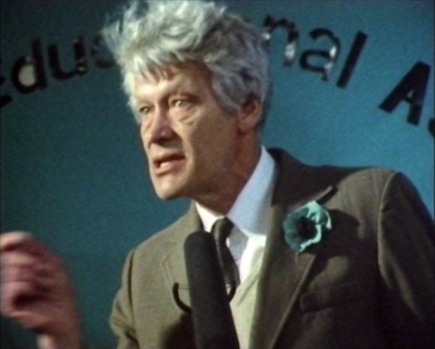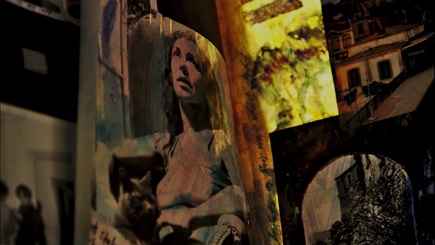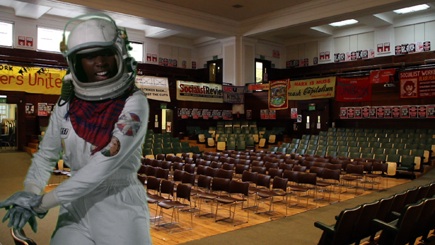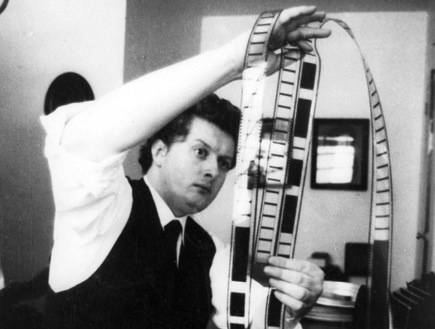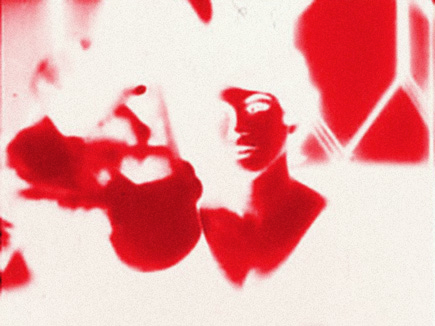
Thursday 11 October 2012, at 6pm, ICA
The seven films made by Peter Kubelka between 1955 and 2003 are an extraordinary demonstration of cinematic possibilities. In the ‘metric’ films Adebar, Schwechater and Arnulf Rainer, each individual element is precisely placed in relation to each other and the whole, resulting in a rhythmic viewing experience that articulates his assertion that ‘film is not movement’. The ‘metaphoric’ works Mosaik im Vertrauen, Unsere Afrikareise, Pause! and Dichtung und Wahrheit explore ways in which meaning can be constructed by the juxtaposition of images and sound. Astounding at first sight, our understanding of these films deepens with repeated viewings. Mark Webber
‘Kubelka’s cinema is like a piece of crystal, or some other object of nature: It doesn’t look like it was produced by man; one could easily conceive that it was picked up from among the organic treasures of nature.’ (Jonas Mekas)
Mosaik im Vertrauen
Peter Kubelka | Austria 1955 | 17 min
‘Kubelka’s motives for making the film lie in his belief that commercial films do not fully exploit cinematic possibilities. He declares that the place of the plot and its ostensibly disparate scenes in the screen, and the time shall be any time at which the film is shown.’ (Alfred Schmeller)
Adebar
Peter Kubelka | Austria 1957 | 2 min
‘Here, at last, is a filmmaker´s ear that creates in contrapuntal accord with his eye in the making. If the projection of Adebar is perfectly synced, the experience is an indescribably new one for any with eyes and ears to see/hear it.’ (Stan Brakhage)
Schwechater
Peter Kubelka | Austria 1958 | 1 min
‘Kubelka’s achievement is that he has taken Soviet montage one step further. While Eisenstein used shots as the basic units and edited them together in a pattern to make meanings, Kubelka has gone back to the individual still frame as the essence of cinema.’ (Fred Camper)
Arnulf Rainer
Peter Kubelka | Austria 1960 | 6 min
‘Arnulf Rainer is an architecture built in time by cinema. It uses only the four essential elements of the medium: light, darkness, sound and silence.’ (Peter Kubelka)
Unsere Afrikareise
Peter Kubelka | Austria 1966 | 13 min
‘Unsere Afrikareise is about the richest, most articulate, and most compressed film I have ever seen. Kubelka’s film is one of the cinema’s few masterpieces and a work of such great perfection that it forces one to re-evaluate everything that one knew about cinema. The incredible artistry of this man, his incredible patience, his methods of working, and the beauty of his accomplishment, makes the rest of us look like amateurs.’ (Jonas Mekas)
Pause!
Peter Kubelka | Austria 1977 | 12 min
‘Arnulf Rainer’s face art, which constitutes the source of imagery of Pause! is a chapter of modern art in itself. Kubelka had to consume and to transcend not only Arnulf Rainer but also to transcend the entire genre of contemporary art known as face art. Both Rainer and Art disintegrated and became molecules, frames of movement and expression, material at the disposal of the Muse of Cinema. Pause! is an ecstatic work.’ (Jonas Mekas)
Dichtung und Wahrheit
Peter Kubelka | Austria 2003 | 13 min
‘Poetry and Truth features 12 stories; 12 sequences, each composed of one shot that is repeated in three, or five, or a dozen variations. Each take captures a movement from a stasis to motion and back again. For Kubelka, the repetition of physical movement – as in dance, as in film, as in life – is the fundamental law of the universe, from which even civilization’s most complex systems derive.’ (Alexander Horwath)
See also:
Wed 10 – Sun 21 October 2012, 12pm-10pm, BFI: Monument Film (installation)
Saturday 13 October 2012, 1pm, ICA: Fragments of Kubelka
Sunday 21 October 2012, 2pm, NFT3: Peter Kubelka Presents Monument Film

